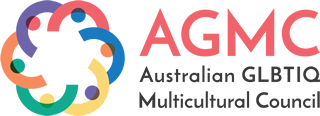Media Release: Australia’s Response To The Situation in Afghanistan Must Be Inclusive for LGBTIQ+ Forcibly Displaced People
Australia’s Response To The Situation in Afghanistan Must Be Inclusive for LGBTIQ+ Forcibly Displaced People
18 August 2021
The Australian GLBTI Multicultural Council (AGMC) extends our heartfelt support to the Afghan community in Australia, especially those who are part of our queer family.
We recognise and feel the pain that conflict brings, with many of our members that we represent, coming from multicultural communities that have also experienced displacement and fled persecution and violence from around the world.
We support in full the 7 steps outlined by the Refugee Council of Australia released on 17 August 2021, and we also urge the Australian Government to take immediate action to provide safety and leadership as the situation in Afghanistan evolves quickly, by:
- Committing to pathways to permanent residency for Afghans currently in Australia on temporary and bridging visas
- Ensuring all Afghans currently in Australia on temporary visas are not deported, especially those who may be looking to seek asylum
- Prioritising family reunion applications for relatives of Afghan Australians, and for the assessment of these applications to be responsive to all family configurations
- Providing urgent humanitarian aid
- Ensuring Australia’s humanitarian program assist displaced Afghans, especially those who are of diverse sexual orientations, gender identity and expression, and sex characteristics
- Ensuring all resettlement programs in Australia are responsive to, and inclusive of, LGBTIQ+ forcibly displaced people
- Providing urgent financial assistance and resources to refugee-led organisations, who are leading the work in the resettlement of LGBTIQ+ forcibly displaced people in our communities.
We will continue to support the Australian Afghan community and offer our prayers and well wishes.
AGMC will commit to advocating for the non-discriminatory treatment of LGBTIQ+ forcibly displaced people from Afghanistan in the coming months, and urges other organisations, especially those providing resettlement services, to recognise and accommodate for the unique experiences of LGBTIQ+ forcibly displaced peoples.
Quotes attributable to Giancarlo de Vera, President of the Australian GLBTI Multicultural Council:
“‘LGBTIQ+ forcibly displaced peoples’ experiences must be recognised in Australia’s humanitarian program and resettlement services”.
“Cultural and religious challenges are often barriers to family reunion applications. Organisations that provide assistance with humanitarian visa applications, must be properly resourced to support LGBTIQ+ forcibly displaced peoples coming properly”.
Quotes attributable to Renee Dixson, Acting Chair of the Forcibly Displaced People Network (FDPN)
“We anticipate that LGBTIQ+ people will be disproportionately targeted with people being subjected to homophobicly motivated sexual violence, forced marriages, honour killings and other forms of conversion practices. Australia needs to ensure quick pathways to safety to all Afghan people at risk of violence”.
Media enquiries:
Giancarlo de Vera, President, AGMC: giancarlo@agmc.org.au
Renee Dixson, Acting Chair, FDPN: admin@fdpn.org.au
END
—-
About AGMC
AGMC is the national peak body representing LGBTIQ+ people from multicultural and multifaith backgrounds. Our mission is to advocate for the rights of multicultural and multifaith LGBTIQ+ communities through advocacy, research, education and community events. Our vision to for a world without prejudice and discrimination on the basis of sexuality, sex, gender, race, culture, and religion, and for our diverse, unique and intersectional identities to be celebrated.
About FDPN
Forcibly Displaced People Network (FDPN) is the first organisation in Australia to dedicate its work to the issues of LGBTIQ+ forced displacement and be driven by the lived experience of it. FDPN is established to promote human rights and inclusion of LGBTIQ+ persons in forced displacement through peer support and strengthening services and policy responses. FDPN builds upon successful work of the Queer Sisterhood Project and the 2019 Queer Displacements Conference.

